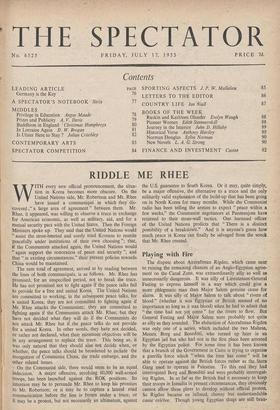RIDDLE ME RHEE
WITH every new official pronouncement, the situa- tion in Korea becomes more obscure. On the United Nations side, Mr. Robertson and Mr. Rhee have issued a communiqué in which they dis- covered ." a large area of agreement " between them. Mr. Rhee, it appeared, was willing to observe a truce in exchange for American economic, as well as military, aid, and for a mutual security pact with the United States. Then the Foreign Ministers spoke up. They said that the United Nations would " assist the stout-hearted and sorely tried Koreans to reunite peacefully under institutions of their own choosing "; that, if the Communists attacked, again, the United Nations would " again support the restoration of peace and security "; and that " in existing circumstances," their present policies towards China would be maintained.
The sum total of agreement, arrived at by reading between the lines of both communiqu6s, is as follows. Mr. Rhee has promised, for an unspecified period, not to break the truce. He has not promised not to fight again if the peace talks fail to provide for a free and united Korea. The United Nations are committed to working, in the subsequent peace talks, for a united Korea; they are not committed to fighting again if Mr. Rhee attacks the Communists; they are committed to fighting again if the Communists attack Mr. Rhee; but they have not decided what they will do if the Communists do not attack Mr. Rhee but if the peace talks do not provide for a united Korea. In other words, they have not decided. or rather not declared, what their minimum objectives will be in any arrangement to replace the truce. This being so, it Was only natural that they should also not decide when, or whether, the peace talks should be broadened to include the recognition of Communist China, the trade embargo, and the other related issues.
On the Communist side, there would seem to be an equal indecision.' A major offensive, involving 60,000 well-armed troops, has been launched against the ROK positions. Its intention may be to persuade Mr. Rhee to keep his promises to Mr. Robertson; or it may be to capture a lateral road communication before the line is frozen under a truce; or it may be a protest, but not necessarily an ultimatum, against the U.S. guarantee to South Korea. Or it may, quite simply, be a major offensive, the alternative to a truce and the only militarily valid explanation of the build-up that has been going on in North Korea for many months. While the Communist radio has been telling the armies to expect " peace within a few weeks," the Communist negotiators at Panmunjom have returned to their stone-wall tactics. One harassed officer of the United Nations predicts that " There is a distinct possibility of a breakdown." And it is anyone's guess how much peace in Korea can finally be salvaged from the wreck that Mr. Rhee created.


























 Previous page
Previous page